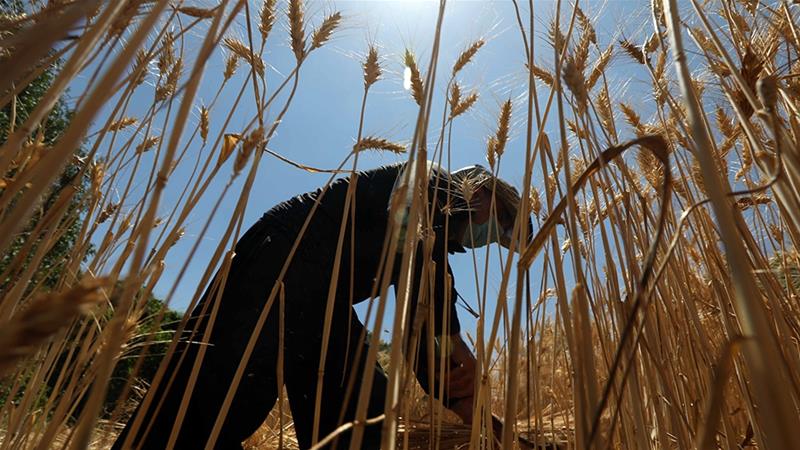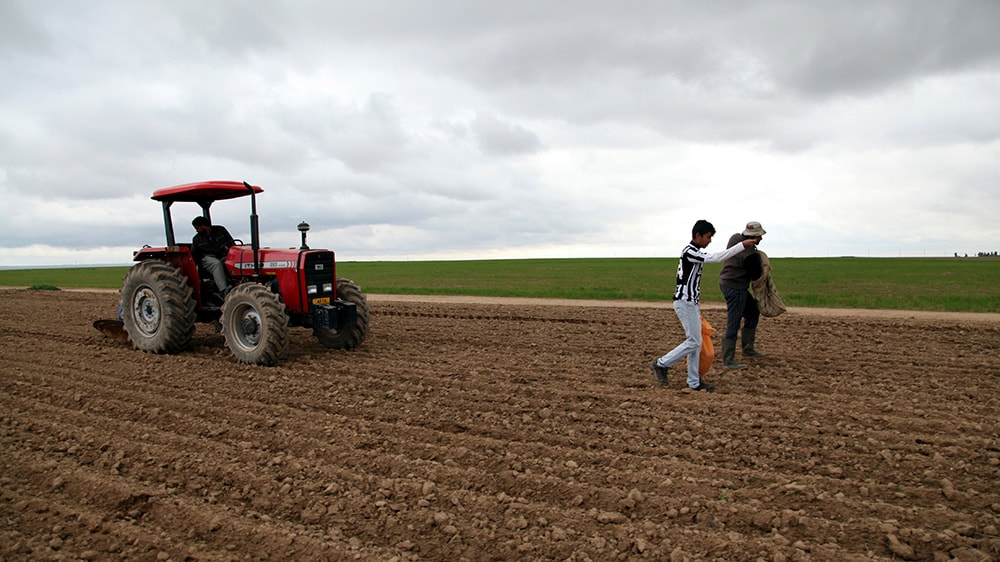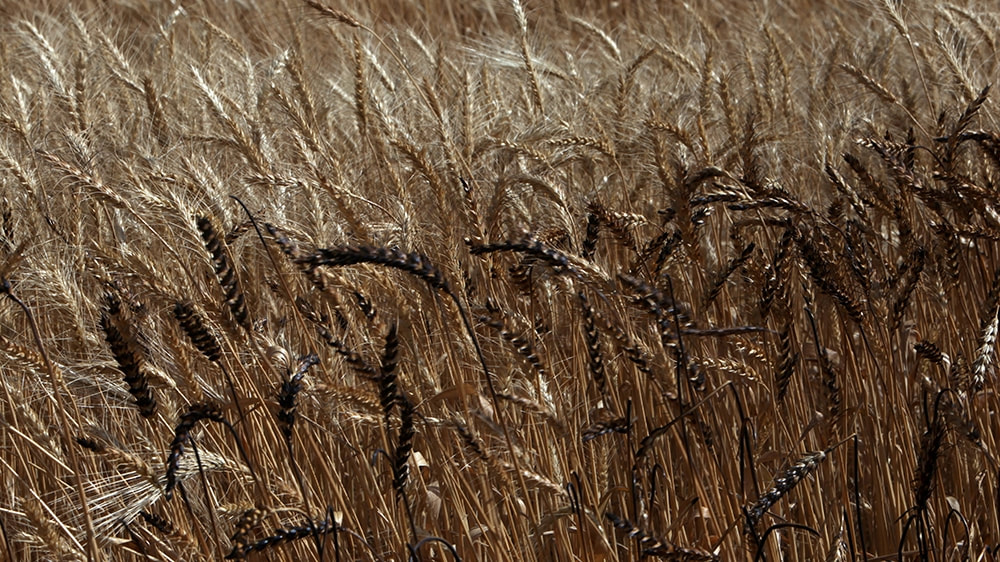Madaen, Iraq - Dozens of trucks heaped with golden piles of wheat smouldered in the summer heat outside the government-run silo. A group of farmers, anxious to sell their harvest, crowded the reception area, guarded by gun-toting soldiers and plain-clothed security officials.
"My truck has been in line for 10 days," said Ibrahim Khalil, a farmer from the Madaen area, about 50km (20 miles) south of Iraq's capital Baghdad. "I'm getting tired of waiting. For every extra day, I have to pay the truck driver extra money."
At the heart of these delays - Al Jazeera found during more than a dozen interviews with farmers, traders and officials - lies an entrenched system of corruption that squeezes the very farmers the government's programme to buy grains at a preferential price is meant to support.
For a truck to enter the silo and pass the quality-control process, a bribe of one to two million Iraqi dinars ($800-$1,600) is required, an amount many smallholders cannot spare.
On Monday, the speaker of parliament called for a meeting to discuss mounting grievances over silos. The Ministry of Trade is the entity that manages dozens of silos across the country filled with an estimated $2bn worth of grain to supply Iraq's vast food ration programme.
But farmers say this year, the process to vend their crops to the silo has been particularly tenuous.
Their struggles lay bare the obstacles facing Iraq's new government led by Prime Minister Mustafa al-Kadhimi to develop non-oil sectors of the economy such as agriculture, as the country reels from a deepening fiscal crisis triggered by the drop in global oil prices and the coronavirus pandemic.
Perverse incentives
The government's grain-purchasing programme aims to encourage local farming while also boosting Iraq's food self-sufficiency.
At the beginning of the planting season, the Ministry of Agriculture specifies the area to be cultivated by each farmer. Based on this plan, farmers receive a paper slip from the ministry that entitles them to market a certain amount of their harvest to the government at a preferential price, provided that their grain passes the quality control process at the silo. Grades one, two and three earn farmers a preferential rate of $466, $391, and $308 per tonne of wheat, respectively, approximately double the market price. Traders are not permitted to sell to silos.
But the difference between the market and silo prices appear to have laid fertile ground for arbitration, shutting out smallholders while incentivising collusion between powerful silo employees and traders.
"Farmers don't have the money to pay, but traders do," a former employee at the Ministry of Trade with knowledge of the inner workings of silos told Al Jazeera, requesting anonymity because of the sensitive nature of the topic. "The director of the silo takes money from the sellers, the lab takes money from the sellers; there's no car that enters without paying."
Abdelrahman Aji Toufan, general manager of the Iraqi Grain Board, denied systematic irregularities at the silos, but added that "around 10" employees are currently under investigation across the roughly 50 silos under the company's responsibility.
"In all the silos, we have oversight bodies and the farmers can complain against any employee and we will send this employee to investigation," he said. "But just based on talk here and there without any evidence, we cannot act."
But a recent parliamentary probe suggests fraud at the silos is a common phenomenon.
A report written by parliament member Hamid al-Mosawi in April this year, and seen by Al Jazeera, describes dizzying corruption schemes in the various state-owned companies under the Ministry of Trade, including the Iraqi Grain Board. It confirms merchants sell wheat under the names of farmers and manipulate the evaluation process in coordination with silo management.
Iraq's national security agency, which has investigated corruption at the Ministry of Trade and has an oversight role at the silos, confirmed al-Mosawi's allegations are factual.
The parliament report also found collusion to import cheap wheat from the Kurdish region of Iraq and neighbouring countries, which is then sold to silos at the preferential price as if it was local produce. It is a practice that appears to date back several years.
"There was collusion between the traders, smugglers and corrupted employees to sell imported wheat to silos as if it was local," said Mohammed Shia al-Sudani, a parliament member who acted as minister of trade in 2015 and 2016. During his brief tenure, al-Sudani said he had reported several employees to Iraq's integrity commission, which investigates graft, but was unaware if those people had been prosecuted.
Mystery lentils
"Wheat rejected because of lentils" read the verdict by a lab technician at the Rusafa silo, scribbled on a piece of paper and tucked it into the plastic bag that contained a sample of the doomed harvest, now ruled unfit for the country's food ration programme.
Such rejections over isolated pieces of lentils and peas have startled local farmers, as neither crop is cultivated in the area.
"It's impossible," said Ghadbaan Mustafa, whose family's harvest was rejected twice, first because of black grains and the second time, after he cleansed and re-submitted his produce to the lab, because of lentils.
"How come they didn't see the lentils the first time they checked?" Mustafa wondered.
"It's all just pressure to make the farmers pay," he concluded when asked why he thought the silo rejected his produce.
Complaints similar to those in the Madaen area have emerged across Iraq. In Kirkuk, farmers have recently organised protests against high rates of rejection at local silos because of lentils.
According to the Iraqi Grain Board, the rejection rate is about 10 percent. But many small-scale farmers who fear an unfavourable lab ruling opt to preemptively sell to wholesalers, voluntarily foregoing the preferential rate at the silo.
Adding to their fears are significant delays in payments by the silo as a result of the fiscal crisis. Farmers who sold their crops to the government at the end of April had yet to be paid by the beginning of June, far beyond the mandated 72-hour payment period.
'Those who pay will be received'
Clutching a small plastic bucket with a sample of his wheat, farmer Mounem Hassun got out of a yellow "Saiba" taxi at the Nahrawan wholesale market. Too poor to own a car or mobile phone, he could not afford to grease the wheels at the silo, nor the fees for truck drivers as they waited in line for days.
"The silo says the grains have flaws, or they tell you to come back later, so you keep coming back, and it's expensive for you," said Hassun, whose family has no income other than farming. Amid anxiety over mounting bills, including what he owed for fertilizer and the harvesting machine, Hassun had little choice but to peddle his hard-earned yield at the wholesale market.
"Do you want cash or credit," wholesaler Rasoul Faleh asked Hassun, digging his hand into the plastic bucket and examining a fistful of the golden cereals.
"Cash, of course," Hassun replied.
"I'll take it for 425,000 Iraqi dinars ($354, per tonne) on credit," Faleh said, meaning that Hassun would only get paid after the trader sold the harvest at the silo.
Merchants flipping the farmers' grain at the silo was an open secret at the wholesale market in Nahrawan, located half an hour's drive northeast of the Rusafa silo.
"Those who pay will be received, and most of them are traders. This is the truth," wholesaler Rasoul Faleh Hassan said, though he stopped short of admitting to having paid a bribe himself.
To access the silos, traders either brought the farmer along or posed as one, after purchasing his Ministry of Agriculture slip that authorises sales to the silo. The deputy director of the Rusafa silo denied that produce was bought from traders instead of farmers.
Neither the farmers nor the traders in Madaen appeared to consider the option to sell to private grinding mills or local retailers, a sign of how the government's purchasing programme and preferential price had de-incentivised the development of a private supply chain for wheat, allowing cheap imported flour to dominate the retail market.
Ghadbaan Mustafa, the farmer whose crops have been twice rejected and currently awaiting a third assessment, said the silo was his only option.
"If they reject my grain again, I will not cultivate next year," he said.
Source




 RSS Feed
RSS Feed